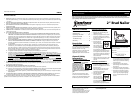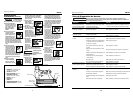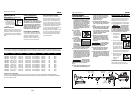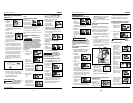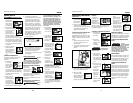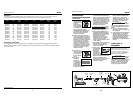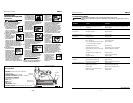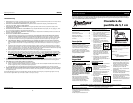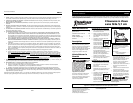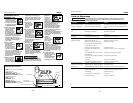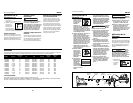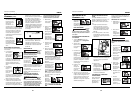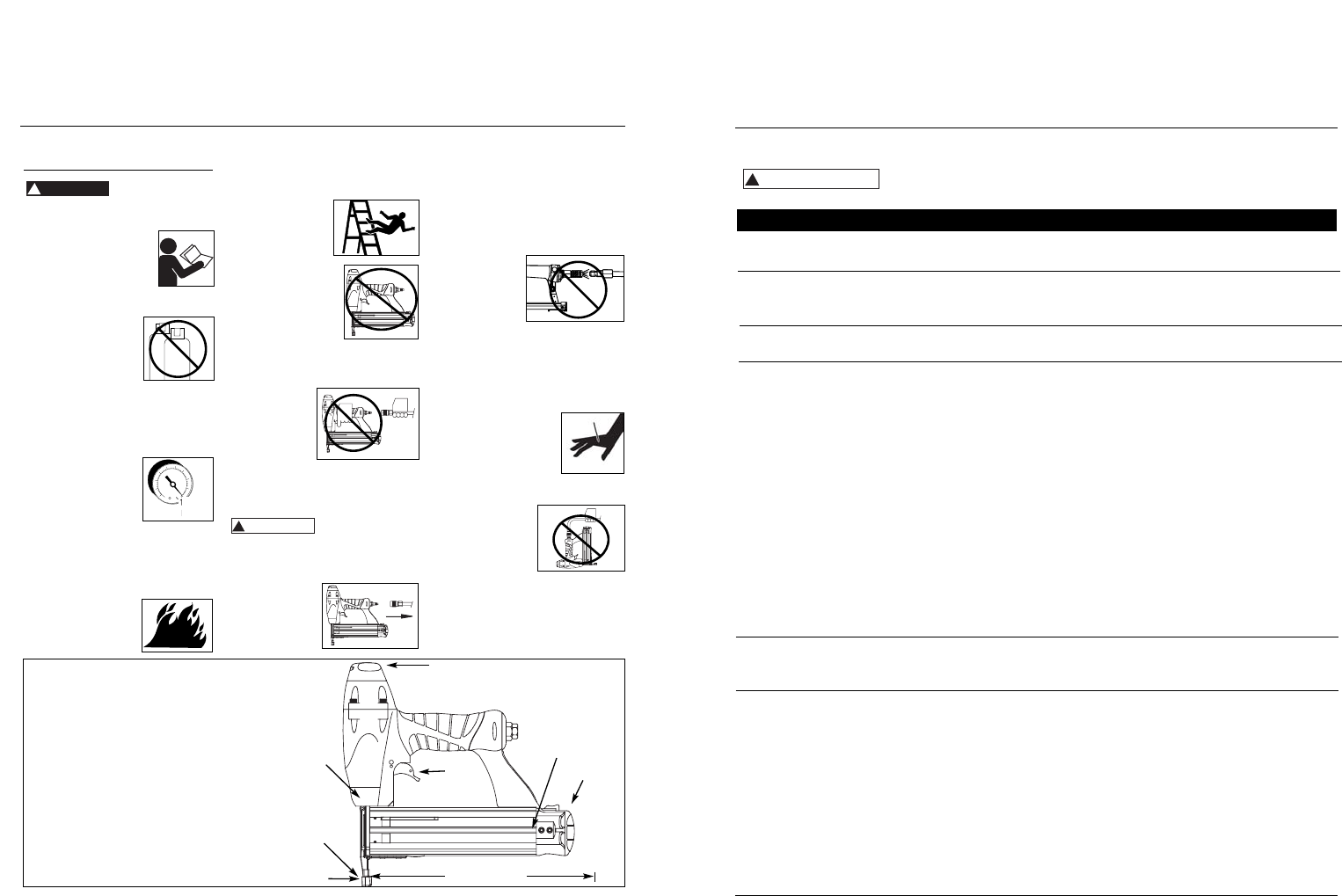
7-Sp
Manual de Instrucciones
IFN102
Hay una fuga de aire en el
área de la válvula del gatillo
Hay una fuga de aire entre
la cubierta y la boquilla
Hay una fuga de aire entre
la cubierta y la tapa
La clavadora deja de clavar
un clavo
La clavadora funciona lenta-
mente o pierde su potencia
Hay clavos atascados en la
clavadora
Los anillos en O de la cubierta de la válvula
del gatillo están dañados
Los anillos en O están dañados
La cubierta está dañada
Los tornillos están flojos
El empaque está dañado
La cubierta está desgastada
La boquilla está sucia
La suciedad o daños evitan el desplazamien
to libre de los clavos o el mecanismo de
impulso en el cargador
El resorte del mecanismo de impulso está
dañado
El flujo de aire hacia la clavadora es inade-
cuado
El anillo en O del pistón está desgastado o le
falta lubricación
Los anillos en O de la válvula del gatillo
están dañados
Hay fugas de aire
Hay una fuga en el empaque de la tapa
La clavadora no está bien lubricada
El resorte de la tapa del cilindro está roto
El orificio de salida de la tapa está obstruído
La guía del mecanismo de impulso está desgas
tada
Los clavos no son del tamaño adecuado.
Los clavos están doblados
Los tornillos del cargador o de la boquilla están
flojos
El mecanismo de impulso está dañado
Guía de Diagnóstico de Averías
Deje de usar la clavadora inmediatamente si alguno de los siguientes problemas ocurre.
Podría resultado en heridas graves. Cualquier reparación o reemplazo de piezas los debe hacer
un técnico calificado personal de un centro autorizado de servicio.
!
ADVERTENCIA
Problema Causa Solución
Debe reemplazar los anillos en O & chequear el funcion-
amiento del elemento de funcionamiento al contacto
Debe reemplazar los anillos en O
Debe reemplazar la defensa
Debe apretar los tornillos
Debe reemplazar el empaque
Debe reemplazar la cubierta
Debe limpiar el canal del sistema de impulso
Debe limpiar el cargador
Debe reemplazar el resorte
Cheque las conexiones, la manguera o el compresor
Debe reemplazar los anillos en O. Lubríquelos.
Debe reemplazar los anillos en O
Debe apretar los tornillos y las conexiones
Debe reemplazar el empaque
Necesita lubricar la clavadora
Debe reemplazar el resorte
Debe reemplazar las partes internas dañadas
Debe reemplazar la guía
Debe usar los clavos recomendados para esta clavadora
Reemplácelos con clavos en buenas condiciones
Debe apretar los tornillos
Debe reemplazar el mecanismo de impulse de clavos
2
General Safety
Information (Continued)
Danger indicates
an imminently haz-
ardous situation which, if not avoided,
WILL result in death or serious injury.
● Read and understand
tool labels and manual.
Failure to follow warn-
ings, dangers, and cau-
tions could result in
DEATH or SERIOUS
INJURY.
● Do not use any type
of reactive gases,
including, but not lim-
ited to, oxygen and
combustible gases, as
a power source. Use
filtered, lubricated, regulated com-
pressed air only. Use of a reactive
gas instead of compressed air may
cause the nailer to explode which
will cause death or serious personal
injury.
● Use only a pressure-
regulated compressed
air source to limit the
air pressure supplied
to the tool. The regu-
lated pressure must
not exceed 100 psi. If the regulator
fails, the pressure delivered to the
tool must not exceed 200 psi. The
nailer could explode which will
cause death or serious personal
injury.
● Never use gasoline
or other flammable
liquids to clean the
nailer. Never use the
!
DANGER
nailer in the presence of flammable
liquids or gases. Vapors could ignite
by a spark and cause an explosion
which will result in death or serious
personal injury.
● Always remain in a
firmly balanced
position when
using or handling
the nailer.
● Do not remove, tam-
per with, or other-
wise cause the Work
Contact Element
(WCE) or trigger to
become inoperable.
Do not operate any
tool which has been modified in a
like fashion. Death or serious per-
sonal injury could result.
● Do not touch
the trigger
unless driving
nails. Never
attach air line
to nailer or
carry nailer
while touching the trigger. The tool
could eject a fastener which will
result in death or serious personal
injury.
Warning indicates
a potentially
hazardous situation which, if not avoid-
ed, COULD result in death or
serious injury.
● Always discon-
nect the tool
from the power
source when
unattended,
performing any
!
WARNING
maintenance or repair, clearing a
jam, or moving the tool to a new
location. Always reconnect the air
line BEFORE loading any fasteners.
Do not load the tool with fasteners
when either the trigger is depressed
or the Work Contact Element (WCE)
is engaged. The nailer could eject a
fastener causing death or serious
personal injury.
● Always fit tool
with a fitting or
hose coupling
on or near the
tool in such a
manner that all
compressed air
in the tool is discharged at the time
the fitting or hose coupling is dis-
connected. Do not use a check valve
or any other fitting which allows air
to remain in the nailer. Death or seri-
ous personal injury could occur.
● Never place hands or
any other body parts in
the nail discharge area
of the nailer. The nailer
might eject a fastener
and could result in
death or serious per-
sonal injury.
● Never carry the
nailer by the air
hose or pull the
hose to move the
nailer or a com-
pressor. Keep
hoses away from
heat, oil and sharp edges. Replace
any hose that is damaged, weak or
worn. Personal injury or tool dam-
age could occur.
IFN102
Operating Instructions
www.chpower.com
O
CO
2
100
psi
Latch
Magazine
Work contact
element (WCE)
Nail discharge Area
Trigger
Nail loading area
Cap exhaust
Nailer Components and Specifications
• REQUIRES: 1.3 SCFM with 10
nails per minute @ 90 PSI
• AIR INLET: 1/4” NPT
• NAIL SIZE RANGE:5/8” to 2”
• MAGAZINE CAPACITY:
100 Nails per load, 18 gauge
• WEIGHT: 3 lb, 6 oz
• LENGTH:10”
• HEIGHT:9”
• MAXIMUM PRESSURE:100 PSI
• PRESSURE RANGE:60 – 100 PSI
Nozzle shield



